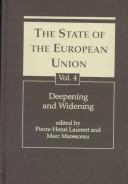| Listing 1 - 3 of 3 |
Sort by
|
Book
ISBN: 147420161X 1782255885 9781782255895 1782255893 9781782255888 9781474201612 1849466343 9781849466349 9781849466349 Year: 2016 Publisher: Oxford Portland, Or.
Abstract | Keywords | Export | Availability | Bookmark
 Loading...
Loading...Choose an application
- Reference Manager
- EndNote
- RefWorks (Direct export to RefWorks)
Of the many challenges that society faces today, possibly none is more acute than the security of ordinary citizens when faced with a variety of natural or man-made disasters arising from climate and geological catastrophes, including the depletion of natural resources, environmental degradation, food shortages, terrorism, breaches of personal security and human security, or even the global economic crisis. States continue to be faced with a range of security issues arising from contested territorial spaces, military and maritime security and security threats relating to energy, infrastructure and the delivery of essential services. The theme of the book encompasses issues of human, political, military, socio-economic, environmental and energy security and raises two main questions. To what extent can international law address the types of natural and man-made security risks and challenges that threaten our livelihood, or very existence, in the twenty-first century? Where does international law fall short in meeting the problems that arise in different situations of insecurity and how should such shortcomings be addressed?
Book

ISBN: 9781685858230 1685858236 Year: 2023 Publisher: Boulder
Abstract | Keywords | Export | Availability | Bookmark
 Loading...
Loading...Choose an application
- Reference Manager
- EndNote
- RefWorks (Direct export to RefWorks)
The struggle between those who seek a more integrated, and even a federal, Europe and those proposing a looser confederation was once again highlighted at the 1996-1997 Intergovernmental Conference, and reflected in the IGC’s decisions. This fourth volume in the European Community Studies Association's biennial series examines the divisions within the EU in the key areas of the common foreign and security policy, European monetary union, enlargement, and structural reform.


ISBN: 9781685858230 9781555877200 Year: 2023 Publisher: Boulder Lynne Rienner Publishers
Abstract | Keywords | Export | Availability | Bookmark
 Loading...
Loading...Choose an application
- Reference Manager
- EndNote
- RefWorks (Direct export to RefWorks)
| Listing 1 - 3 of 3 |
Sort by
|

 Search
Search Feedback
Feedback About UniCat
About UniCat  Help
Help News
News